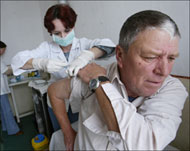Bird flu reaches eastern Europe
Bird flu has been detected in samples from Romanian ducks, confirming that the virus has arrived in Eastern Europe, according to the country’s chief veterinarian.

Romania first reported bird flu last week in its Danube delta region, which attracts migratory birds from Russia, Scandinavia, Poland and Germany.
Romania said on Thursday its scientists detected H5 avian virus in samples from ducks and announced plans to slaughter thousands of birds.
Turkey detected bird flu last Saturday after 2000 birds died on a farm near the Aegean Sea. Some 2500 birds were culled to prevent the virus from spreading and quarantine zones were imposed.
The threat led many countries to ban imports of poultry and poultry products from Turkey and Romania.
They include Albania, Bosnia, Bulgaria, Croatia, Macedonia, Serbia, Kosovo province, Montenegro, Switzerland, Ukraine, Greece and Georgia.
Precautionary measures
As part of the efforts being made to try to prevent the spread of the virus, Hungary, the only European Union member bordering Romania, said on Thursday that all trucks carrying poultry which transit through Romania would be disinfected at the border to combat the spread of bird flu.
 |
|
A man gets an anti-flu |
Hungary increased checks on poultry in September, and banned the import of poultry meat and livestock from Romania.
Bulgaria has also tested around 30 birds found dead around the country for avian flu but found no cases as it tightens controls after suspected outbreaks in its Black Sea neighbours, officials said on Thursday.
Croatia started testing wild ducks and domestic poultry on Thursday in a campaign to prevent the spread of potentially deadly avian flu, which has been found in Turkey and Romania.
Greek health authorities, fearful of a spread of bird flu into the country, were checking a Portuguese-flagged cargo ship near the port of Piraeus on Thursday after finding suspect dead and living migratory birds on board.
Imports ban
The European Commission announced a ban on 10 October on all imports of live birds and feathers from Turkey into the 25-nation EU after Ankara confirmed the avian flu outbreak. It banned similar imports from Romania on Thursday.
Russia reported a strain of H5N1 bird flu in a wild bird in Siberia in October 2004. It banned poultry imports from Italy following an outbreak of avian flu in the Italian province of Brescia in April 2005, and lifted the ban on 4 October. Russia detected the less virulent AH5 virus in July 2005 and culled 120,000 birds and quarantined its Novosibirsk region.
Britain stockpiled 14.6 million courses of the antiviral drug Tamiflu in March 2005 in case of an outbreak of bird flu.
It culled nearly 3000 pheasants in July after an outbreak of Newcastle disease, a strain of avian flu unrelated to the current Asian outbreak. In September 2005 it sent doctors guidance on identifying and containing an outbreak of the virus.
After the Russian outbreak, France told poultry producers to be on guard for any illness among their flocks.
Italy detected a low risk H5N2 avian flu virus in April 2005 and destroyed at least 180,000 turkeys, but the outbreak did not pose a threat to public health.
An outbreak of suspected bird flu in 2003 led to the slaughter of a quarter of all Dutch poultry at a cost of hundreds of millions of euros.